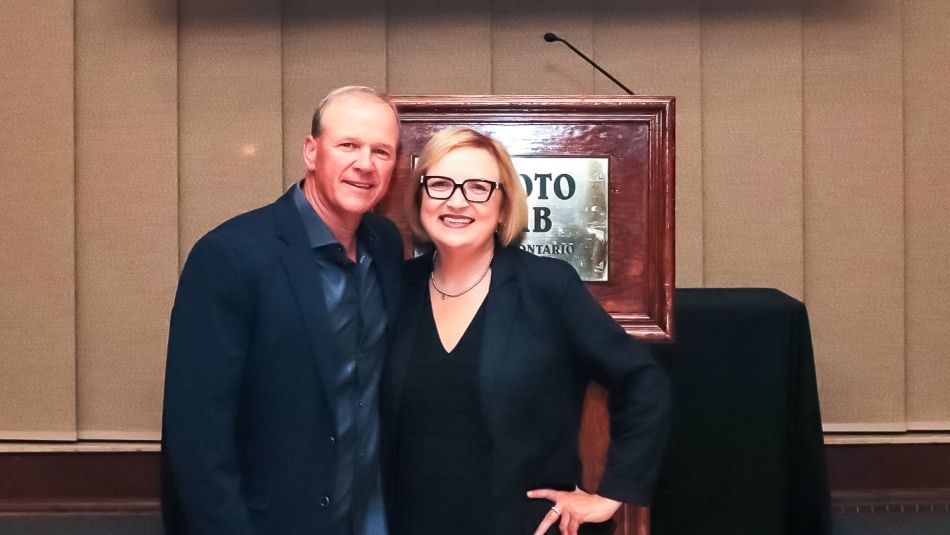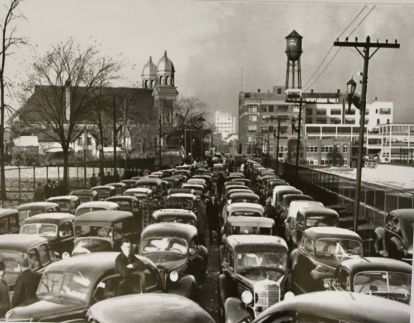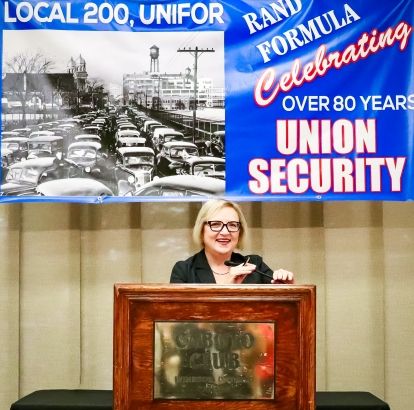
Share
In Windsor, Ontario, the site of the historic strike that led to the Rand Formula, Unifor marked 80 years since the 1945 Ford Strike, a defining moment that reshapedCanadian labour rights and inspired generations of workers. Unifor National President Lana Payne joined members, retirees, and community leaders to honour that legacy and reaffirm the fight for fairness, justice, and solidarity.
Lana Payne remarks:
Good evening and solidarity with you all.
So wonderful to be here and to join with you in celebrating a monumental fight and victory for our union and for the entire Canadian Labour Movement.
First let me thank John and Local 200 for this very kind invitation to join you all in Windsor. Thank you for organizing this exceptionally fine celebration to mark the 80th anniversary of one of - if not the most significant strikes in Canadian labour movement history. Windsor’s own general strike.
It was a strike for union security, a strike that changed the course of our labour movement in this country, a strike that soundly rejected this idea of “right to work” and instead propelled the Canadian union movement in this country into a place of strength, resistance and working-class power.
Yes, it started right here in Windsor and at Local 200, the birth of union security for all Canadian workers. The ability to collectively pool our resources and to use the power of our collective dues to fight back against corporations and governments. To defend the interest of workers while fighting for progress for the working class.
There have been many times over the past 80 years when employers and politicians have tried to roll back the clock on what was fought for during this historic strike in 1945 at Ford Motor Company’s operations in Canada. But our union and the labour movement have continued to vigorously defend union security. We have fought to protect the principle that everyone who benefits from the collective agreement must pay union dues.
We have defeated political opponents like Tim Hudak and others who tried to advance these anti-union and anti-worker laws in our own country.
But, as you know, there is no time to take such important rights for granted. We must remain vigilant and reject complacency at every turn in the union movement.
In 1945, Ford Motor Company was the largest employer in all of Canada. Local 200 was the single largest local union in Canada, with Local 195 the second largest.
When Ford Local 200 workers were on strike for 5 weeks, it was Local 195 that stepped up with a serious show of solidarity. It was thousands of Local 195 members from GM, Chrysler, and various parts plants in Windsor who shut down their own factories to join Local 200 on the picket line – with no strike pay – for nearly a month.
Imagine a situation where workers will go without pay, for one month, to help other workers win the right to have union dues taken off their pay cheque!
Imagine how challenging a fight that would be today, in the current context.
And yet, together, 11,000 Local 200 members and thousands of workers from more than 25 different workplaces formed the famous vehicle Blockade of the Ford plant.
Here’s the beautiful irony: Workers were using the very products that their own hands built, as the tool of resistance and militancy against their employer and a repressive state.
Is it any wonder why Windsor is Canada’s union town? It’s in the water. And it’s certainly in the DNA.
The passionate support of the Windsor community – from the mayor, to local churches and small business organizations, to other groups of workers, was arguably the beginning of this incredible, organic worker solidarity that personifies the Windsor community. It lives on today through in all of you - every single local union leader and activist.
As you all know, the company eventually accepted a proposal to send the dispute to binding arbitration and the issue of union security was handed to Justice Ivan Rand.
Six weeks after the Ford workers went back to work Rand ruled: He awarded dues check off in the collective agreement: pronouncing that everyone in the workplace benefits from the union and so everyone should pay. No free-riders.
This was an early example of what happens during auto bargaining and in auto collective agreements lifts up other workers throughout the industrial economy. (Not unlike what happened after the historic 2023 auto agreements when other workers were inspired to fight for similar wages and benefit gains!)
By the end of 1946, just 12 months after the Blockade, 23 agreements in Windsor had successfully implemented the Rand Formula, including at Chrysler. GM reluctantly agreed the following year, in 1947.
Eventually, the Rand Formula spread into legislation – benefiting all union members, in Quebec in the 70s and Ontario in the 80s – inspired by another historic strike by our sisters at Fleck manufacturing in 1978 – who, in the face of state repression and police violence, stood firm for women workers all across this country, demanding union security in their collective agreement. And then winning it into law.
Our union proved itself to be at the forefront of building the Canadian Labour movement – through grit and determination.
Windsor is a testament to that grit. A testament to how we build worker power and no matter the challenges in front of us how we can overcome. We do it together and yes sometimes that means we must fight back in profound ways.
As we gather here today, the challenges we face are different, but just as big as the ones we faced 80 years ago. Canada’s auto and manufacturing sector is in the crosshairs of a trade war initiated by U.S. President Trump. The livelihoods of thousands of workers are at stake. It is through our incredible union – the one that we belong to, love and collectively fund – that we can fight back, that we can resist, and that we can fight for a world that works for workers.
In the face of these challenges, let’s always remember the incredible fighting spirit, courage and determination of those who fought on the front lines in 1945.
Let’s be prepared to do everything we must to protect Canadian jobs. To protect Canadian workers. And to fight like hell for our rights – an push for new ones - with the same fierceness, courage and determination as those that came before us.
Because when we fight, we win.
Solidarity, friends. And thank you for your trade union activism and for continuing to build our union.




